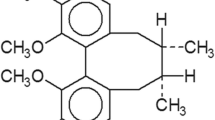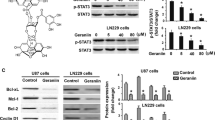Abstract
Glioma is the most common primary brain tumors with diverse biological behavior. Paeonol, a phenolic component extracted from the root bark of Paeonia × suffruticosa Andrews, Paeoniaceae, has demonstrated cytotoxic and potential anti-cancer effects both in vitro and in vivo. However, the potential impact and underlying mechanisms of paeonol on glioma remain elusive. The anti-glioma function of paeonol was examined by cell counting kit-8, cell cycle assay, and annexin V/PI apoptosis detection kit. Additionally, xenograft experiment was applied to investigate the inhibitory effect of paeonol in vivo. Finally, the change of apoptosis-related factors mediated by paeonol was detected via quantitative real-time PCR and western blot. In CCK8 assay, the IC50 values of paeonol in U87MG cells were 473.85 μg/ml at 24 h and 401.20 μg/ml at 48 h, respectively. Similarly, the IC50 values of PAE in U251 cells were 120.60 μg/ml at 24 h and 87.62 μg/ml at 48 h, respectively. Moreover, paeonol significantly induced the apoptosis and cell cycle arrest in G1 phase of glioma cells. Furthermore, paeonol remarkably suppressed the growth of glioma cells in vivo. Mechanically, PAE induced the apoptosis of glioma cells via upregulating the anti-apoptotic proteins BAX, BID and BAK, and downregulating the anti-apoptotic protein BCL-2.
Graphical Abstract








Similar content being viewed by others
Data Availability
The data that support the findings of this study are available on request from the corresponding author. The data are not publicly available due to privacy or ethical restrictions.
References
Cai J, Chen S, Zhang W, Hu S, Lu J, Xing J, Dong Y (2014) Paeonol reverses paclitaxel resistance in human breast cancer cells by regulating the expression of transgelin 2. Phytomedicine 21:984–991. https://doi.org/10.1016/j.phymed.2014.02.012
Chou TC (2003) Anti-inflammatory and analgesic effects of paeonol in carrageenan-evoked thermal hyperalgesia. Br J Pharmacol 139:1146–1152. https://doi.org/10.1038/sj.bjp.0705360
Davis ME (2018) Epidemiology and overview of gliomas. Semin Oncol Nurs 34:420–429. https://doi.org/10.1016/j.soncn.2018.10.001
Fan K, Jia X, Zhou M, Wang K, Conde J, He J, Tian J, Yan X (2018) Ferritin nanocarrier traverses the blood brain barrier and kills glioma. ACS Nano 12:4105–4115. https://doi.org/10.1021/acsnano.7b06969
Fan L, Song B, Sun G, Ma T, Zhong F, Wei W (2013) Endoplasmic reticulum stress-induced resistance to doxorubicin is reversed by paeonol treatment in human hepatocellular carcinoma cells. PLoS One 8:e62627. https://doi.org/10.1371/journal.pone.0062627
Gao L, Wang Z, Lu D, Huang J, Liu J, Hong L (2019) Paeonol induces cytoprotective autophagy via blocking the Akt/mTOR pathway in ovarian cancer cells. Cell Death Dis 10:609. https://doi.org/10.1038/s41419-019-1849-x
Hsieh CL, Cheng CY, Tsai TH, Lin IH, Liu CH, Chiang SY, Lin JG, Lao CJ, Tang NY (2006) Paeonol reduced cerebral infarction involving the superoxide anion and microglia activation in ischemia-reperfusion injured rats. J Ethnopharmacol 106:208–215. https://doi.org/10.1016/j.jep.2005.12.027
Kim SA, Lee HJ, Ahn KS, Lee HJ, Lee EO, Ahn KS, Choi SH, Jung SJ, Kim JY, Baek N, Kim SH (2009) Paeonol exerts anti-angiogenic and anti-metastatic activities through downmodulation of Akt activation and inactivation of matrix metalloproteinases. Biol Pharm Bull 32:1142–1147. https://doi.org/10.1248/bpb.32.1142
Kim SH, Kim SA, Park MK, Kim SH, Park YD, Na HJ, Kim HM, Shin MK, Ahn KS (2004) Paeonol inhibits anaphylactic reaction by regulating histamine and TNF-alpha. Int Immunopharmacol 4:279–287. https://doi.org/10.1016/j.intimp.2003.12.013
Kumar V, Gu Y, Basu S, Berglund A, Eschrich SA, Schabath MB, Forster K, Aerts HJ, Dekker A, Fenstermacher D, Goldgof DB (2012) Radiomics: the process and the challenges. Magn Reson Imaging 30:1234–1248. https://doi.org/10.1016/j.mri.2012.06.010
Li N, Fan LL, Sun GP, Wan XA, Wang ZG, Wu Q, Wang H (2010) Paeonol inhibits tumor growth in gastric cancer in vitro and in vivo. World J Gastroenterol 16:4483–4490. https://doi.org/10.3748/wjg.v16.i35.4483
Liu LH, Shi RJ, Chen ZC (2020) Paeonol exerts anti-tumor activity against colorectal cancer cells by inducing G0/G1 phase arrest and cell apoptosis via inhibiting the Wnt/β-catenin signaling pathway. Int J Mol Med 46:675–684. https://doi.org/10.3892/ijmm.2020.4629
Louis DN, Perry A, Wesseling P, Brat DJ, Cree IA, Figarella-Branger D, Hawkins C, Ng HK, Pfister SM, Reifenberger G, Soffietti R (2021) The 2021 WHO classification of tumors of the central nervous system: a summary. Neuro Oncol 23:1231–1251. https://doi.org/10.1093/neuonc/noab106
Meng Y, Wang M, Xie X, Di T, Zhao J, LinY, Xu X, Li N, Zhai Y, Wang Y, Li P (2017) Paeonol ameliorates imiquimod-induced psoriasis-like skin lesions in BALB/c mice by inhibiting the maturation and activation of dendritic cells. Int J Mol
Morsy MA, Abdel-Aziz AM, Abdel-Hafez SMN, Venugopala KN, Nair AB, Abdel-Gaber SA (2020) The possible contribution of P-glycoprotein in the protective effect of paeonol against methotrexate-induced testicular injury in rats. Pharmaceuticals 13:223. https://doi.org/10.3390/ph13090223
Nicholas MK, Lukas R, Bangalore S (2005) Chemotherapy for malignant glioma. Expert Rev Neurother 5:S41-49. https://doi.org/10.1586/14737175.5.6.S41
Noh T, Mustroph M, Golby AJ (2021) Intraoperative imaging for high-grade glioma surgery. Neurosurg Clin 32:47–54. https://doi.org/10.1016/j.nec.2020.09.003
Ostrom QT, Bauchet L, Davis FG, Deltour I, Fisher JL, Langer CE, Pekmezci M, Schwartzbaum JA, Turner MC, Walsh KM, Wrensch MR (2014) The epidemiology of glioma in adults: a “state of the science” review. Neuro Oncol 16:896–913. https://doi.org/10.1093/neuonc/nou087
Tsai CF, Su HH, Chen KM, Liao JM, Yao YT, Chen YH, Wang M, Chu YC, Wang YH, Huang SS (2020) Paeonol protects against myocardial ischemia/reperfusion-induced injury by mediating apoptosis and autophagy crosstalk. Front Pharmacol 11:586498. https://doi.org/10.3389/fphar.2020.586498
Xu Y, Zhu JY, Lei ZM, Wan LJ, Zhu XW, Ye F, Tong YY (2017) Anti-proliferative effects of paeonol on human prostate cancer cell lines DU145 and PC-3. J Physiol Biochem 73:157–165. https://doi.org/10.1007/s13105-016-0537-x
Yang Q, Wang S, Xie Y, Wang J, Li H, Zhou X, Liu W (2010) Effect of salvianolic acid B and paeonol on blood lipid metabolism and hemorrheology in myocardial ischemia rabbits induced by pituitruin. Int J Mol Sci 11:3696–3704. https://doi.org/10.3390/ijms11103696
Yang P, Wang Y, Peng X, You G, Zhang W, Yan W, Bao Z, Wang Y, Qiu X, Jiang T (2013) Management and survival rates in patients with glioma in China (2004–2010): a retrospective study from a single-institution. J Neurooncol 113:259–266. https://doi.org/10.1007/s11060-013-1103-9
Yang Z, Bi Y, Xu W, Guo R, Hao M, Liang Y, Shen Z, Yin L, Yu C, Wang S, Wang J (2022) Glabridin inhibits urothelial bladder carcinoma cell growth in vitro and in vivo by inducing cell apoptosis and cell cycle arrest. Chem Biol Drug Des. https://doi.org/10.1111/cbdd.14147
Yang J, Xu L, Wu M, Fang H, Lu Y, Shi C, Wang Y, Jiang S, Ma Q, Li Z, Zhang L (2021) Paeonol derivative-6 attenuates inflammation by activating ZEB2 in acute liver injury. Int Immunopharmacol 91:107235. https://doi.org/10.1016/j.intimp.2020.107235
Yin J, Wu N, Zeng F, Cheng C, Kang K, Yang H (2013) Paeonol induces apoptosis in human ovarian cancer cells. Acta Histochem 115:835–839. https://doi.org/10.1016/j.acthis.2013.04.004
Zhang W, Cai J, Chen S, Zheng X, Hu S, Dong W, Lu J, Xing J, Dong Y (2015) Paclitaxel resistance in MCF-7/PTX cells is reversed by paeonol through suppression of the SET/phosphatidylinositol 3-kinase/Akt pathway. Mol Med Rep 12:1506–1514. https://doi.org/10.3892/mmr.2015.3468
Zhang L, Chen WX, Li LL, Cao YZ, Geng YD, Feng XJ, Wang AY, Chen ZL, Lu Y, Shen AZ (2020) Paeonol suppresses proliferation and motility of non-small-cell lung cancer cells by disrupting STAT3/NF-κB signaling. Front Pharmacol 11:572616. https://doi.org/10.3389/fphar.2020.572616
Funding
This work was supported by the Fundamental Research Funds for the Central Universities (buctrc201910), the Young Elite Scientists Sponsorship Program by Xinjiang Association for Science and Technology (2021), the Beijing-Tianjin-Hebei Basic Research Cooperation Special Project (19JCZDJC65800(Z)), and the Scientific and Technological Research Project of Xinjiang Production and Construction Corps (2022AB022).
Author information
Authors and Affiliations
Contributions
ZY and JZ conceived and designed the article. MH and KZ carried out the experiments and wrote the manuscript. HW, JW and RC supervised the bioactivity testing and revised the manuscript. JL and QZ provided study materials, reagents, and instruments. All authors approved the final version of the manuscript.
Corresponding authors
Ethics declarations
Ethical Approval
All animal experimental protocols were reviewed and approved by the Animal Care Review Committee of the China-Japan Friendship Hospital (2021–42-K26).
Rights and permissions
Springer Nature or its licensor (e.g. a society or other partner) holds exclusive rights to this article under a publishing agreement with the author(s) or other rightsholder(s); author self-archiving of the accepted manuscript version of this article is solely governed by the terms of such publishing agreement and applicable law.
About this article
Cite this article
Hao, M., Zhang, K., Wang, H. et al. Paeonol Inhibits Glioma Growth In Vivo and In Vitro by Inducing Apoptosis and Cell Cycle Arrest. Rev. Bras. Farmacogn. 33, 534–542 (2023). https://doi.org/10.1007/s43450-023-00380-z
Received:
Accepted:
Published:
Issue Date:
DOI: https://doi.org/10.1007/s43450-023-00380-z




